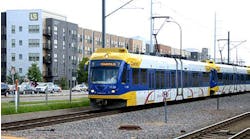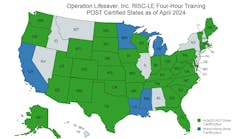Houston's light rail project achieved a milestone Monday with the signing of $900 million in grant agreements by the head of the Federal Transit Administration.
The grants, the first federal funds ever provided for rail in Houston, were formally approved Monday in a pep rally-like ceremony attended by FTA chief Peter Rogoff, Mayor Annise Parker, Metropolitan Transit Authority officials, local members of Congress and others. They will pay more than half the estimated $1.6 billion combined cost of the North and Southeast lines, scheduled for completion in 2014, which will extend Houston's light rail network by 12 miles.
"This has been a long train running," Metro chairman Gilbert Garcia said during the ceremony at a rail construction site on Burnett Street.
Local officials have been trying to secure the federal funds since voters approved a plan to expand Metro's rail network in 2003. Those who have worked on the project over the years, including former Houston Mayor Bill White, blamed the long delay on an arduous grant process, a divided congressional delegation and stiff competition with other cities.
"Prior to 2004, there had been a vigorous and good faith disagreement between at least two congressmen led by Tom DeLay and other House and Senate members concerning a fixed-line transit system," White said Monday. "That disagreement on rail has gone on for decades."
By 2005, Metro officials got congressional members on board. Republican Sen. Kay Bailey Hutchison succeeded in getting language supporting Houston mass transit into congressional legislation, White said. From there, a lengthy grant process of public hearings, environmental impact studies and cost analysis ensued, followed by bid approvals.
"It's very complex," said former Metro Chairman David Wolff, who served under White and attended Monday's ceremony. "All in all, we were on the goal line when our board went out about 18 months ago. This board took it across the goal line and I give them credit for that."
Law violation
A major hurdle emerged last year when the grants were threatened by an FTA investigation that found Metro's procurement process for rail cars had violated federal law. To requalify, the FTA said Metro had to cancel its contract with CAF USA, the U.S. subsidiary of a Spanish firm, and solicit new proposals. Metro complied.
In September the FTA notified four congressional committees of its plan to execute the grant agreements.
The money, to be paid over five years, is still subject to annual congressional appropriations, and some skeptics say full appropriations are unlikely due to pressure for federal budget cuts.
"This rail not only moves people in Houston, but it will ultimately be the backbone of a system that connects this entire region," Parker said during the ceremony Monday.
The mayor and other speakers stressed that the federal investment in the rail lines would bring jobs and economic growth to Houston.
Rogoff, the FTA administrator, mentioned the investigation during his remarks at Monday's ceremony.
He said some mistakes were made but all parties agreed that Houston residents shouldn't suffer.
His office, Parker and Metro officials worked together on a plan to put the project back on track, he said.
"The fourth-largest city in the United States deserves a world-class transit system that will meet the region's needs for the 21st century, and the investments we are making today will accomplish that," Rogoff said.
Recognition
Rogoff said Texas' congressional delegation deserved recognition for ensuring that the grant money has been included in President Barack Obama's annual budgets.
Of the $900 million, Congress has already set aside more than one-third - $334.5 million - and Metro has received checks for about $84.5 million, Metro officials said.
The agency agreed to provide some of the funds prior to the signing of the agreement because it believed Metro's projects were worthy.
Metro is also seeking federal money for the University line, the longest in its planned system.
That project is at an earlier stage of development, and funding prospects are uncertain.
Copyright 2008 LexisNexis, a division of Reed Elsevier Inc. All rights reserved.
Terms and Conditions |Privacy Policy


